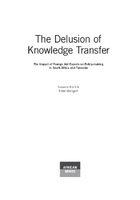The Delusion of Knowledge Transfer
The Impact of Foreign Aid Experts on Policy-making in South Africa and Tanzania
| dc.contributor.author | Koch, Susanne | |
| dc.contributor.author | Weingart, Peter | |
| dc.date.accessioned | 2018-12-12 12:09:23 | |
| dc.date.accessioned | 2020-04-01T12:24:13Z | |
| dc.date.available | 2020-04-01T12:24:13Z | |
| dc.date.issued | 2016 | |
| dc.identifier | 1001045 | |
| dc.identifier | OCN: 1076711751 | en_US |
| dc.identifier.uri | http://library.oapen.org/handle/20.500.12657/28914 | |
| dc.description.abstract | With the rise of the ‘knowledge for development’ paradigm, expert advice has become a prime instrument of foreign aid. At the same time, it has been object of repeated criticism: the chronic failure of ‘technical assistance’ – a notion under which advice is commonly subsumed – has been documented in a host of studies. Nonetheless, international organisations continue to send advisors, promising to increase the ‘effectiveness’ of expert support if their technocratic recommendations are taken up. This book reveals fundamental problems of expert advice in the context of aid that concern issues of power and legitimacy rather than merely flaws of implementation. Based on empirical evidence from South Africa and Tanzania, the authors show that aid-related advisory processes are inevitably obstructed by colliding interests, political pressures and hierarchical relations that impede knowledge transfer and mutual learning. As a result, recipient governments find themselves caught in a perpetual cycle of dependency, continuously advised by experts who convey the shifting paradigms and agendas of their respective donor governments. For young democracies, the persistent presence of external actors is hazardous: ultimately, it poses a threat to the legitimacy of their governments if their policy-making becomes more responsive to foreign demands than to the preferences and needs of their citizens. | |
| dc.language | English | |
| dc.subject.classification | thema EDItEUR::J Society and Social Sciences::JH Sociology and anthropology::JHB Sociology | en_US |
| dc.subject.classification | thema EDItEUR::J Society and Social Sciences::JP Politics and government::JPP Public administration | en_US |
| dc.subject.classification | thema EDItEUR::J Society and Social Sciences::JP Politics and government::JPS International relations | en_US |
| dc.subject.other | policy | |
| dc.subject.other | Africa | |
| dc.subject.other | knowledge | |
| dc.subject.other | Tanzania | |
| dc.subject.other | South Africa | |
| dc.subject.other | HIV/AIDS | |
| dc.subject.other | World Bank | |
| dc.title | The Delusion of Knowledge Transfer | |
| dc.title.alternative | The Impact of Foreign Aid Experts on Policy-making in South Africa and Tanzania | |
| dc.type | book | |
| oapen.relation.isPublishedBy | 69707d01-8e78-4a41-abff-fccf8fb5f4a5 | |
| oapen.collection | ScholarLed | |
| oapen.pages | 396 | |
| oapen.remark.public | Relevant Wikipedia pages: HIV/AIDS - https://en.wikipedia.org/wiki/HIV/AIDS; South Africa - https://en.wikipedia.org/wiki/South_Africa; Tanzania - https://en.wikipedia.org/wiki/Tanzania; World Bank - https://en.wikipedia.org/wiki/World_Bank | |
| oapen.remark.public | 21-7-2020 - No DOI registered in CrossRef for ISBN 9781928331391 | |
| oapen.identifier.ocn | 1076711751 |

